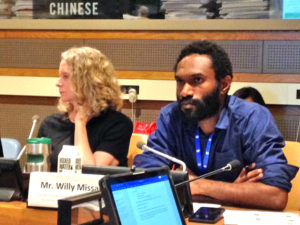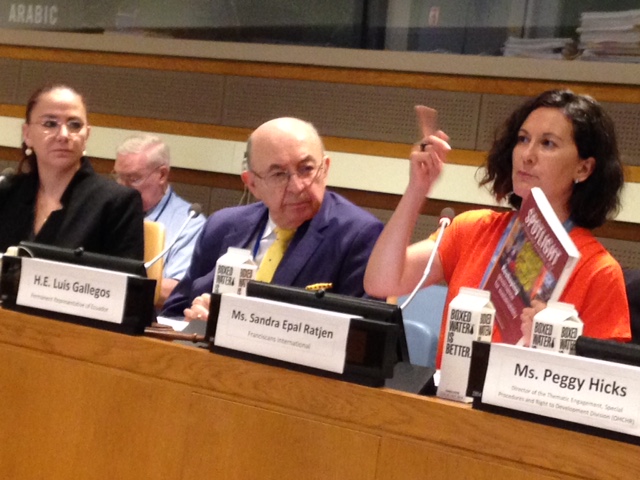By: Sr. Barbara Bozak
“Empowering people and ensuring inclusiveness and equality” was the theme of the High Level Political Forum on Sustainable Development, held at the UN Headquarters in New York on July 9-18 of this year.  The main focus of this annual meeting is a review of the progress made, the gaps brought to light and the obstacles to achieving Agenda 2030 with its 17 Sustainable Development Goals. Since it is impossible to examine all 17 goals every year, the UN chooses 5 goals to consider closely at each High Level Political Forum. This year the goals examined were SDG 4 – quality education; SDG 8 – decent work and economic growth; SDG 10 – reduced inequalities; SDG 13 – climate action; and SDG 16 – peace, justice, and strong institutions.
The main focus of this annual meeting is a review of the progress made, the gaps brought to light and the obstacles to achieving Agenda 2030 with its 17 Sustainable Development Goals. Since it is impossible to examine all 17 goals every year, the UN chooses 5 goals to consider closely at each High Level Political Forum. This year the goals examined were SDG 4 – quality education; SDG 8 – decent work and economic growth; SDG 10 – reduced inequalities; SDG 13 – climate action; and SDG 16 – peace, justice, and strong institutions.
The Sisters of St. Joseph were represented at this meeting by four Sisters from four different congregations: Sr. Emelie Zoeline, a sister of the Aoste (Italy) congregation from the Ivory Coast; Sr. Sue Wilson, from the Congregation of the Sisters of St. Joseph in Canada; Sr. Marianne Sennick, from the Brentwood, NY congregation; and Sr. Barbara Bozak of the Sisters of St. Joseph of Chambéry, the official representative of the Congregations of St. Joseph at the UN. They were able to profit from both the official UN meetings which included panel discussions on each of the above-mentioned SDGs and numerous side events which had been organized by different NGOs.
One of the topics addressed at side events was the importance of using a human rights focus in all discussions of climate change. The reality is that climate change with the resultant global warming, rising of sea levels, drought in some areas and heavy rains with flooding in others, affects the poor and most vulnerable to a greater extent than those who have more resources. Small island developing nations are experiencing the ocean claiming more and more of their land. Drought and the inability to farm or raise animals to support themselves has led many to migrate, within their own country, on their continent or farther. Flooding destroys property, both homes and businesses, and those who live in poverty lack the resources to rebuild.
Philip Alston, the special rapporteur on extreme poverty and human rights, noted that even the UN Human Rights Council does not see the urgency of addressing the issue of climate change. And major corporations, especially those involved in extraction and production of fossil fuels — while responsible for 71 percent of greenhouse gas emissions between 1998 and 2015 — take no responsibility for this but rather receive generous government subsidies. It has also been reported that many major corporate executives consider human rights to be a threat to their profit margin and so are against them. Thus, trying to achieve SDG 10 — reduced inequalities — is one of the greatest struggles of Agenda 2030.
Each of the four Sisters of St Joseph present at this UN Forum on Sustainable Development realizes the importance of her role in working at the local level to address climate change, achieve greater equality within her society and advance the SDGs, doing this by responding to the local situation and working with others in her own city and country.

